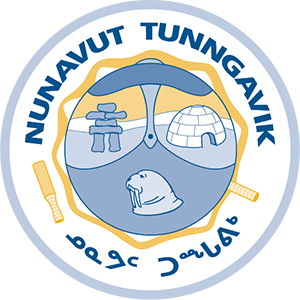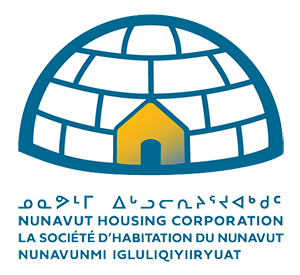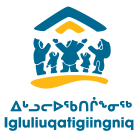

ABOUT US
Collaborating to address land supply challenges to support more diverse and appropriate house options for Nunavummiut.
Federal Government
Canada Mortgage and Housing Corporation
Supporting the supply of housing and land for homes through investments such as the Housing Supply Challenge Round 3 (Northern Access Round)
L4H Partners

Nunavut Tunngavik Incorporated
NUNAVUT TUNNGAVIK INCORPORATED (NTI) - Fosters Inuit economic, social and cultural well-being through the implementation of the Nunavut Land Claims Agreement (NLCA) while also ensuring that other parties to the NLCA meet their obligations.
Angirratsaliulauqta
THE NUNAVUT INUIT HOUSING ACTION PLAN (NIHAP) seeks to coordinate and guide the resources and actions of Designated Inuit Organizations to help meet the full range of housing needs of Nunavut Inuit.
![]() NTI provides significant investment and ensures that benefits to flow to the
three Regional Inuit Associations (RIAs) who represent Inuit in each of the
three regions of Nunavut. The RIAs collaborated with NTI in the creation and
implementation of the NIHAP.
NTI provides significant investment and ensures that benefits to flow to the
three Regional Inuit Associations (RIAs) who represent Inuit in each of the
three regions of Nunavut. The RIAs collaborated with NTI in the creation and
implementation of the NIHAP.

Nunavut Association of Municipalities
Municipal Advocacy
Advocates on behalf of Nunavut’s 25 municipal governments to ensure the collective voice will have an impact leading to changes that better supports Nunavut’s communities.

Nunavut Housing Corporation
NUNAVUT HOUSING CORPORATION (NHC) - Provides opportunities for all residents of Nunavut to have homes that support a healthy, secure, independent and dignified lifestyle by delivering Public Housing, and actively supporting industry partners to deliver affordable and market housing units to Nunavummiut.
 Igluliuqatigiingniq
Igluliuqatigiingniq
The Nunavut 3000 Strategy leverages NHC, its partners and housing sector stakeholders’ capacity to deliver 3000 new units across the housing continuum in Nunavut by 2030.
Stakeholders
Engaged in the supply, administration, and selection of appropriate land for homes.
Regional Inuit Associations & Regional Development Corporations constraints
INUIT REGIONAL DEVELOPMENT CORPORATIONS (IRDCs) – IRDCs are an economic development extension of the RIAs and support business opportunities, such as development and construction, in each of the three regions of Nunavut.
Nunavut’s 25 Municipalities
Participate in or direct land planning processes; prepares land for new development; manage aggregate supplies required for new construction; administer land inventory leasing and development permits; and act as information resource for housing providers and other housing stakeholders.
Government of Nunavut
GOVERNMENT OF NUNAVUT DEPARTMENT OF COMMUNITY AND GOVERNMENT SERVICES – Supports land planning processes; supports local communities in their land related roles; maintains a Planning and Lands mapping and database system; ensures alignment of capital planning and land development activity with housing supply needs, and coordinates infrastructure capacity with growth.
WHAT IS NUNAVUT’S LAND FOR HOMES INITIATIVE (L4H)?
Land and Housing partners are working together to support the supply of appropriate build-ready land and more housing options for Nunavummiut.
WHO IS PARTICIPATING IN THE L4H INITIATIVE?
Nunavut Housing Corporation (NHC), Nunavut Tunngavik Inc. (NTI), and the Nunavut Association of Municipalities (NAM) are project partners. Key stakeholders include the Regional Inuit Associations, local municipalities, and the Government of Nunavut’s Department of Community and Government Services. Project funding is provided by Canada Mortgage and Housing (CMHC).
WHY IS L4H IMPORTANT?
The crisis of inadequate housing continues to harm Nunavummiut. The pace of housing construction in Nunavut has more than doubled in the last two years. Without collaborative action to support timely access to suitable “build-ready” land, fewer new homes will be built.
HOW IS L4H SUPPORTING LAND AND HOUSING PARTNERS?
The L4H Knowledgebase and the L4H Informational Toolset ensure that essential information is accessible to support good decisions in the supply and selection of land for homes.
HOW IS L4H IMPROVING ACCESS TO ESSENTIAL LAND RELATED INFORMATION?
L4H has identified land supply, infrastructure, and data gaps; compiled a knowledgebase of community, neighbourhood, and lot information; developed a Toolset to collect, store, and use land-related data; and provided guides and templates to support housing partners.
WHAT DOES “APPROPRIATE” LAND FOR HOMES MEAN?
Appropriate land has been residentially zoned and is technically suitable, financially affordable and environmentally sustainable. It must also be responsive to community priorities and to the cultural needs of Inuit.
WHAT DOES “BUILD READY” LAND FOR HOMES MEAN?
Build-ready land has been approved for residential use in the municipality’s Community Plan and Zoning Bylaw, and is serviced by infrastructure including roads, drainage, power, and utilidor (where applicable).
HOW LONG DOES IT TAKE TO MAKE LAND FOR HOMES “BUILD READY”
Once a need for land has been identified, land planning and the installation of necessary infrastructure can take several years. Building construction can often start before infrastructure is fully complete.
WHAT HAPPENS AT THE END OF THE CURRENT PHASE OF L4H?
The L4H Knowledgebase and Toolset will be fully available for use by partners and stakeholders by March 31, 2025. A L4H Version 2.0 Strategic Plan lays out how L4H will continue to support housing and land partners into the future.